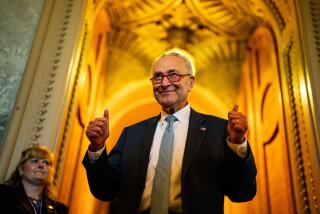Senate Panel Votes to Keep 16 Tax on Cigarettes, OKs New Subsidies for Tobacco
- Share via
WASHINGTON — The Senate Finance Committee voted Friday to continue taxing cigarettes at 16 cents a pack and to levy new taxes on snuff and chewing tobacco. It also approved a controversial new tobacco price support program.
The tax measures, approved on voice votes, thus cleared their biggest hurdle before action on the Senate floor, where prospects are uncertain. First, the package will be sent to the Senate Budget Committee, but little opposition is expected there.
Deadline on Tax
Unless Congress votes to extend the cigarette tax, it will drop to 8 cents a pack on Oct. 1. The House Ways and Means Committee voted last July for the 16-cent tax but not for taxes on “smokeless” tobacco.
Under the measures approved Friday, the new taxes would be about 1.5 cents an ounce on snuff and 2 cents on a standard pouch of chewing tobacco.
Supporters of both taxes see them as a way of helping to reduce the nation’s ballooning federal deficit and of discouraging young persons from taking up the tobacco habit. Making the cigarette tax permanent would generate an extra $4.9 billion in revenue over the next three years, and the smokeless tobacco tax would raise an additional $100 million, they estimate.
But powerful opponents of the taxes--mainly senators from Southern farm states--have contended that the tobacco levies would hurt growers, who already face increasing competition from imports.
The issue was controversial in the Finance Committee not only because of the health dispute over smoking but because the tax was tied to the perennially contentious $100-million-a-year program subsidizing about 200,000 tobacco growers.
The committee acted as some senators expressed obvious befuddlement over the complicated tobacco price support system. At one point, Sen. Daniel Patrick Moynihan (D-N. Y.) declared that the committee process was “not a seemly occurrence.” Moynihan, who good-humoredly confessed a lack of knowledge about tobacco price supports, requested a detailed analysis of the program--”in English.”
Would Cut Loan Rates
The new price support program, developed by Sen. Jesse Helms (R-N. C.), calls for cutting back government loan rates, modifying the system of quotas on growers’ sales and requiring cigarette companies and growers to share the cost of the subsidy program.
To obtain the committee’s backing on price supports, farm-state senators had to agree to vote for the new tobacco taxes, included as part of a package of spending cuts aimed at deficit reduction.
Industry backers of the price support program apparently saw the compromise as a necessary evil. Walker Merryman, vice president of the Tobacco Institute, said: “We would have preferred that the Congress keep its promise not to raise cigarette taxes,” but, “on the other hand, we understand the need” for the price support program.
But David Neumeyer, associate director of the Coalition on Smoking or Health, criticized the committee action as a “bail-out” for the industry.
Although Helms, citing Congressional Budget Office figures, estimates that his plan would save the government $235 million over three years, critics assert that another feature of the bill--selling off surpluses to cigarette manufacturers at huge discounts--would cost taxpayers $400 million to $1 billion.
“The savings are not there,” said Sen. Bill Bradley (D-N. J.), who failed in an attempt to raise the cigarette tax to 20 cents and eventually voted for the 16-cent rate. “The program will cost the government money.”
More to Read
Get the L.A. Times Politics newsletter
Deeply reported insights into legislation, politics and policy from Sacramento, Washington and beyond. In your inbox twice per week.
You may occasionally receive promotional content from the Los Angeles Times.










